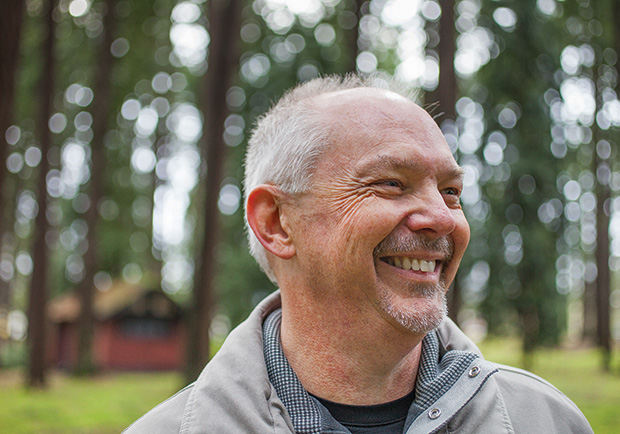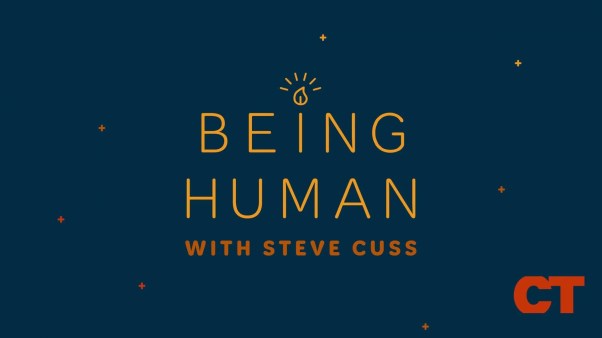William Paul Young has touched a nerve—if sales of millions of books is any sign. Like his sleeper best-selling novel, The Shack, his new book, Cross Roads (FaithWords), covers God, the human condition, and the process of transformation—though a fair amount of teaching finds its way into the story. It's teaching that many Christians have found liberating, and many other Christians have rejected. Given the genre of writing, it's understandable that some readers are left confused about what Young really believes. Christianity Today editor Mark Galli decided to find out.
What are you fundamentally trying to address in your writing?
The nature of the character of God as relational, as a love that pursues us relentlessly and wants to burn out of [us] everything that keeps us from being free. I want to bring to light the process of transformation, what that looks like.
I grew up fundamentalist, evangelical, Protestant. Those are my roots, and they are good roots. But it means the Pharisees are my people. I grew up with an image of God that was not helpful—largely the face of my father expanded. My father and I worked for years to get to a place where reconciliation was possible, and we have. But that had a huge impact on how I viewed the nature and character of God, a theology that fundamentally taught that Jesus came to save us from the Father.
Your books playfully but insistently picture God as Trinity. Why is the Trinity so important to you?
Because it grounds both relationship and love. If you have a distinctiveness of persons within the very nature of God, and you have oneness (which is absolutely essential), you have a basis for love inside the relationship of the Father, Son, and Holy Spirit. This is what Athanasius and Irenaeus and the early church fathers started and ended with. To me, everything relational gets grounded inside of that.
You are fond of calling God Papa. That feels flippant to a lot of readers.
That's my version of Abba. Father is used of God only 15 times in the Hebrew Scriptures. How surprising it is that as a 12-year-old boy raised within the Jewish culture, one of the first things [Jesus does is] refer to God as Father.
I arrived at Papa because Abba never worked for me, even though it's the Aramaic. I love the way Hispanic children refer to their dads: it's always, "Papi! Papi!" It has this sense of, "I love being around you!" Papi is combined with Abba and I ended up with Papa; it worked for me.
Do you call God Papa when you pray?
I do. It took me a long time. First it was God. Then it was the Father. One of the biggest transitions was to go from the Father to Father, which became much more intimate, and then to Papa. It does smack of familiarity, but it's a shared familiarity that Jesus had with Abba. That's what he used almost exclusively.
What's up with picturing God as a black woman?
I'm trying to get far away from [picturing God as] Gandalf or Santa Claus. When I look at Scripture, imagery was never intended to define God. In fact, the more concrete your imagery gets, the more you're toying with idolatry. It's picture language to help us understand the character and nature of God. We have all kinds of imagery in Scripture. You have a woman who loses a coin in the Gospels. You have feminine imagery, masculine imagery, animal imagery—lots of bird imagery, eagles and the mother hen who covers the chicks. We see inanimate object imagery: a rock, a fortress, a strong tower, a shield.
I don't want my kids growing up with the image of God that I had—Plato's white grandfatherly god—because that god is not a very good father. When it comes down to it, you can't trust him with your kids. Plato's god is the indivisible one, who is fundamentally self-centered, rather than Father, Son, and Holy Spirit, the God who is self-giving and other-centered. That changes everything.
How would you describe the root of sin? What is the main problem?
Independence. It is declaring ourselves the arbiters of right versus wrong, rather than being in a dependent relationship. That's another way of saying pride. It's where we declare ourselves or establish our independence from relationship. "You will be like God"—the lie.
How does that manifest itself day to day?
There are a thousand things that come immediately to mind, such as the inability to trust, or the need for control. That would be one of the biggest things, because we create systems in order to not have to trust someone. And systems largely are an expression of our fear, which desires to control so that we have some certainty. When we were children, our receptors got shattered into a billion bits, and the journey the Holy Spirit has us on is largely a journey into trust.
My religious background would say [faith is] about learning how to please God, which isn't about God at all; it's about my ability to perform according to whatever the requirements and the transactions are. Relationship is about learning to trust. Trust is connected in a huge way to the character and nature of God, because you cannot fundamentally trust someone you don't know loves you or is for you.
What is salvation? What does Jesus accomplish on the Cross and in the Resurrection?
For me, salvation is fully accomplished in the work of the Father, Son, and Holy Spirit. It was God in the hands of angry sinners—that's the phrase that I would use. I'm not a penal substitutionary guy. But I am a substitutionary guy. But I don't see the Father pouring out his wrath on the Son. I see the human race pouring out their wrath on the Son. So I see the only hope for the entire cosmos is what the Son chooses to accept, crawling upon the instrument of our greatest wrath. He met us at the deepest, darkest place.
That still gives every single person an eternal and ongoing right to reject this affection. But I don't think it changes the relentless affection. God's pursuit of me is eternal in nature. That's what Romans 8:38-39 is talking about. Read the list of things that cannot separate you from God's love, and you're going to run smack into this: nothing [can separate us].
But the Bible is replete with language of divine wrath, not just the Old Testament but the New as well. What do you make of that?
I am not opposed to wrath at all, but what's changed for me is this: I grew up inside a paradigm that said wrath was punitive and retributive in nature. I now see it as restorative. And part of that is affective.
I don't want my kids growing up with the image of God that I had—Plato's white grandfatherly god. That god is not a very good father. You can't trust him with your kids.
Having children changed a lot for me. If my son was an amphetamine addict, I would like to be a fire and burn that out of my son's life. If I had a daughter who believed a lie about her value, I would want to be a consuming fire—absolutely. I'd want to get inside of that and burn it out.
So to me, fire is something everybody has to deal with, because we all have crap. It needs to be dealt with, and it's going to be. To some degree we're dealing with it in this world, but we're going to deal with it at some point. But it's because of love, not because we fail to live up to expectations.
So do you believe in the Last Judgment—with emphasis on last?
Yeah, probably. If you've read C. S. Lewis's introduction to The Great Divorce, in a beautiful way he acknowledges that he and George MacDonald and other writers are dealing in speculation. The only certainty I have come to with regard to any of this is that I'm now way more certain about the kindness and the goodness of God, even if it's also a fire. I'm certain of his goodness. But I don't know how it all works out.
One question I get, of course, is, "Are you a universalist?" I'm not, because I don't think you can make that step doctrinally. I don't think Scripture is that obvious. There is this respect for the human creation's ability to say no. God will not force love. And we still have to choose to be reconciled. But Colossians says that's what we are to be praying for, that everything gets reconciled back to him.
So, to circle back, your writing is not just about God as relational love, but also about our union with him in the Trinity.
Yes, that objective union is where our hope exists, in the Father, Son, Holy Spirit. Not only were we included in their affection, but then they climbed into our damage. John 14-17 is the center of the Bible; right before Jesus goes to the Garden of Gethsemane, he talks about coming to live inside of us, bringing the Father and the Spirit. It's an objective union.
This is very different from how I grew up. Then, it was, "You are two natures warring it out," and, "Who are you going to feed today?" Instead of: "You're a new creation and you don't know it." Part of this transformation is for us to begin to think accurately about who we are. "As a man thinks in his heart, so is he." If you believe a lie, you will function according to a lie. I'm not at war with myself anymore. No. We are in the process of the healing of the heart and the soul and eventually the body—and all in terms of the reconciliation of this cosmos. I want to be a part of that.









